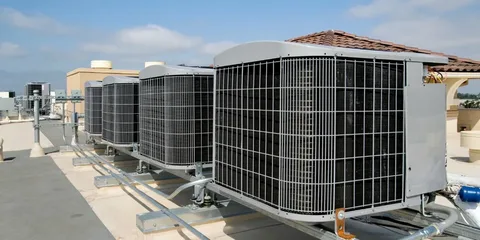How Efficient Commercial Air Conditioning Systems Improve Comfort & Reduce Operating Costs

For business owners and facility managers across Ontario, keeping indoor environments comfortable while managing energy costs can be a constant balancing act. A reliable and efficient commercial air conditioning system isn’t just about cooling , it’s about long-term performance, lower operating expenses, and maintaining a productive workplace.
As energy efficiency standards continue to rise in Canada, choosing the right commercial cooling solution has never been more important. In this guide, we’ll explore how efficient systems improve comfort, reduce waste, and deliver a stronger return on investment for your business.
1. Why Efficiency Matters in Commercial Cooling
Commercial buildings consume a significant portion of total energy use in Ontario , with HVAC systems accounting for up to 40% of that total. When cooling systems are outdated or poorly maintained, they not only waste energy but also affect air quality and comfort levels.
Efficient air conditioning systems help stabilize indoor temperatures, reduce humidity, and maintain consistent airflow. This not only supports employee comfort and productivity but also extends equipment lifespan by preventing overwork and system strain.
Businesses that invest in efficient HVAC technology often see measurable returns through lower monthly energy bills and fewer service interruptions , both crucial advantages in a competitive market.
2. Understanding Commercial HVAC System Types
Not every commercial space has the same needs. From office towers to warehouses and retail spaces, different types of HVAC systems deliver different benefits.
Some of the most common setups include:
- Rooftop units (RTUs) – Compact, self-contained systems ideal for flat-roof commercial buildings. They’re easy to service and don’t take up valuable floor space.
- Split systems – Consist of separate indoor and outdoor units; often used for mid-sized buildings or spaces with varying temperature needs.
- VRF (Variable Refrigerant Flow) systems – Offer precise temperature control and zoning flexibility, perfect for large offices or mixed-use spaces.
- Chiller-based systems – Typically used in industrial or multi-story commercial buildings where large-scale cooling is required.
3. Energy Efficiency Ratings and Regulations in Ontario
In Canada, energy efficiency for HVAC systems is regulated through standards set by Natural Resources Canada (NRCan). Commercial units must meet specific Seasonal Energy Efficiency Ratio (SEER) and Energy Efficiency Ratio (EER) requirements.
High-efficiency systems typically feature variable-speed compressors, advanced heat exchangers, and smart thermostatic controls. These technologies adjust output based on occupancy and outdoor conditions, using only the energy required to maintain comfort.
Upgrading to an ENERGY STAR® certified system ensures compliance with national standards and provides measurable cost savings over time.
4. Smart Controls and Building Automation
Modern commercial HVAC systems often integrate with building automation systems (BAS) that allow facility managers to monitor and adjust cooling remotely. These smart controls can automatically optimize performance based on occupancy patterns and weather data.
For example, a system can reduce cooling output in unoccupied conference rooms or during off-hours, saving energy without compromising comfort. Over time, these intelligent features can significantly reduce operating costs while maintaining stable indoor conditions.
5. Preventive Maintenance and Efficiency Retention
Even the most advanced commercial air conditioner won’t remain efficient without proper maintenance. Dust buildup, clogged filters, and worn components can quickly reduce performance. Scheduling routine inspections ensures your system runs at peak capacity year-round. Regular filter changes, coil cleaning, and refrigerant checks help prevent small issues from turning into major repairs, saving your business time and money.
To better understand one of the most common maintenance issues, you can also read our guide on why air conditioners leak water, which explains what causes leaks, how they affect system efficiency, and when it’s time to call a professional.
7. Rebates, Incentives, and Long-Term ROI
Ontario businesses upgrading to high-efficiency systems may qualify for energy rebates and incentive programs through Save on Energy and similar provincial initiatives. These programs encourage the adoption of energy-saving technologies by offsetting part of the installation cost.
When you calculate long-term ROI, efficient HVAC systems often pay for themselves within a few years , thanks to reduced energy use, improved durability, and less frequent repairs.
Choosing the Right Partner for Commercial HVAC Projects
Selecting the right installation and service partner is just as important as choosing the equipment itself. Look for HVAC professionals who specialize in commercial systems and understand Ontario’s building regulations and energy codes.
A qualified contractor will assess your facility’s specific needs, recommend the most efficient solution, and ensure compliance with all safety and environmental guidelines.
Partnering with a trusted provider like HVAC Near Me gives your business access to experienced technicians, reliable maintenance plans, and transparent recommendations that align with your operational goals.
